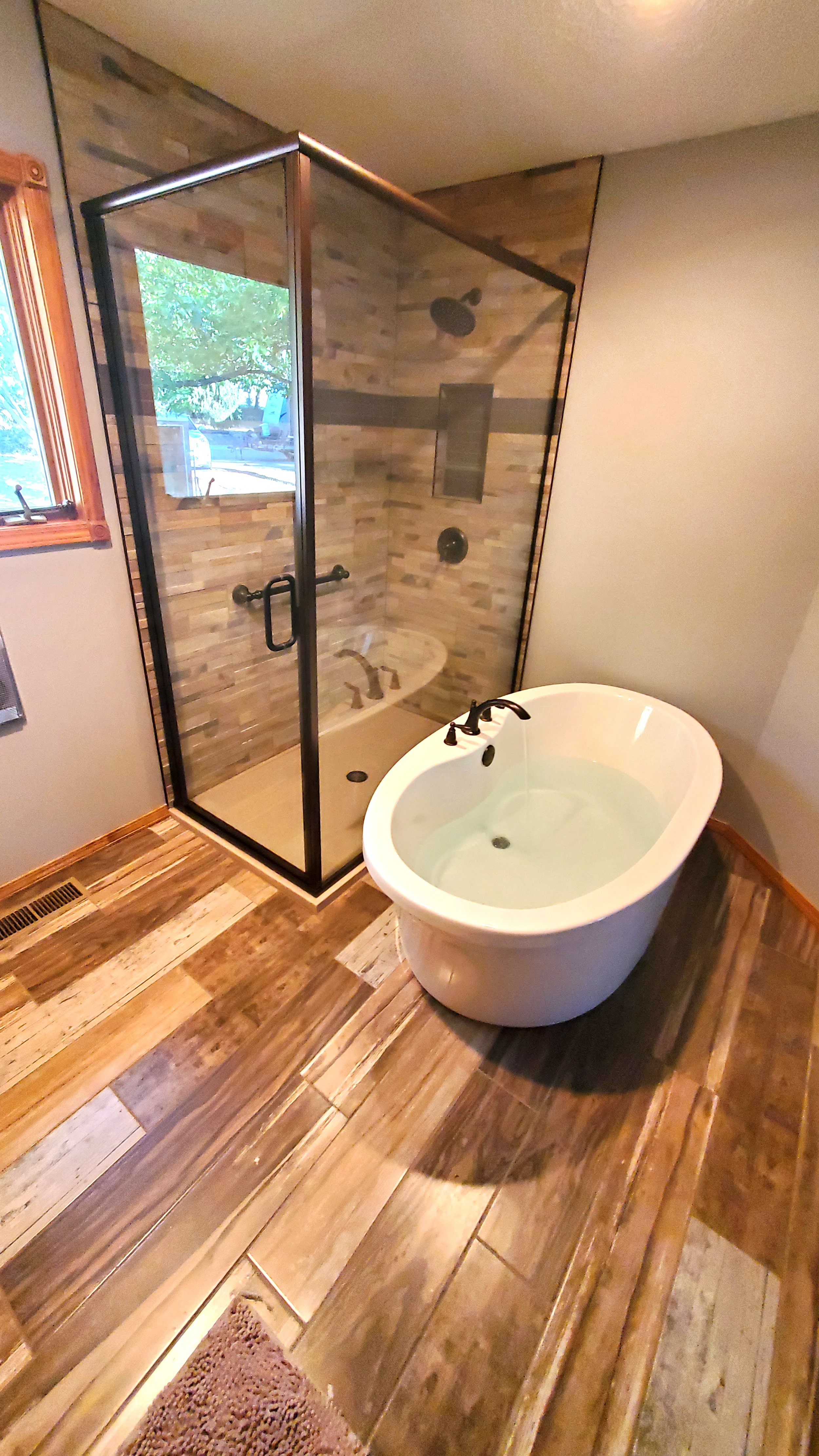What to Consider When Hiring a Contractor:
Hiring the right contractor is one of the most crucial steps in ensuring that your project runs smoothly, stays on budget, and meets your expectations. Whether you’re remodeling your kitchen, building an addition, or tackling any major home project, here are the most important factors to consider when hiring a contractor:
1. Experience and Specialization
Relevant Experience: Look for a contractor who has experience with the specific type of work you're doing. For example, if you’re adding a new room, you’ll want someone with a strong background in home additions rather than someone who primarily does small repairs or landscaping.
Portfolio: A good contractor will have a portfolio of past projects similar to yours. Ask to see photos, and if possible, visit a completed job to assess the quality of their work.
Skills & Certifications: Some jobs (e.g., electrical or plumbing work) may require specific certifications or licenses. Make sure your contractor has the necessary qualifications for any specialized work involved.
2. Reputation and References
Check Reviews: Look for reviews and testimonials from previous clients. Websites like Angi, Google, and Houzz can offer insight into the contractor’s reputation. Don’t just look at the overall rating—read a mix of positive and negative reviews to get a balanced perspective.
Ask for References: A reliable contractor should be able to provide several references from past clients. Contact these references and ask about their experience—did the contractor meet deadlines, communicate well, stay within budget, and deliver quality work?
Online Reputation: See if the contractor is listed with the Better Business Bureau (BBB) or has any industry certifications (e.g., National Association of Home Builders). Membership in professional organizations shows a commitment to quality and ethics.
3. Licensing and Insurance
Proper Licensing: Ensure that the contractor is properly licensed to do the work you’re hiring them for. The specific licensing requirements vary by location, so check with your local authorities or building department.
Insurance: Ask the contractor to provide proof of general liability insurance and worker’s compensation. This protects you in case of accidents or damage to your property during the project. If a contractor is uninsured, you could be held liable for any injuries or damages that occur on your property.
4. Detailed Estimates and Clear Contracts
Written Estimate: The contractor should provide you with a detailed written estimate that outlines the scope of work, materials, labor costs, and any other expenses. This is important for setting expectations upfront and ensuring there are no surprise costs down the road.
Clear Contract: Once you've agreed on the details, make sure you have a formal contract in place. The contract should cover the scope of work, materials, timeline, payment schedule, and any warranties. A clear contract helps prevent misunderstandings later on.
Transparency in Pricing: Be cautious of contractors who offer low bids that seem too good to be true. Often, they might cut corners or use subpar materials. The best contractor may not be the cheapest, but they should provide a fair price based on the quality and complexity of the work.
5. Communication Skills
Responsiveness: A good contractor will respond to your calls and emails promptly. Poor communication can lead to mistakes, delays, and frustration. Make sure the contractor is someone you can easily reach and who keeps you updated on the project.
Clear Communication: The contractor should be able to explain the project clearly, without jargon. They should be open to your questions and provide transparent answers about timelines, costs, and potential challenges.
Problem-Solving Approach: Construction projects often face unexpected challenges. A contractor who is proactive, willing to collaborate, and provides solutions to problems as they arise will save you a lot of headaches.
6. Timeliness and Schedule
Realistic Timeline: Ask the contractor how long the project will take and whether they can commit to that timeline. If they give you an unrealistic timeline, they may be over-promising and under-delivering.
Punctuality: A reliable contractor should show up on time for meetings and be punctual in starting and finishing work. If they are regularly late or reschedule appointments, it could be a red flag.
Project Management: Consider whether the contractor is organized and has a system in place to manage the project. Will they have a team working with them? Will you have a dedicated project manager? Clear oversight helps the project stay on track.
7. Subcontractors
Use of Subcontractors: Many contractors hire subcontractors to handle specialized work, like electrical, plumbing, or HVAC. If the contractor plans to use subcontractors, ask who they are, what their qualifications are, and whether they’ve worked together in the past.
Vet Subcontractors: If the contractor’s subcontractors will be coming onto your property, make sure they’re vetted and qualified as well. A reputable contractor should only work with trusted professionals.
8. Workmanship Warranty
Warranty on Work: A good contractor should stand behind their work. Ask whether they offer a warranty or guarantee on the quality of their craftsmanship. For example, if something goes wrong within a few months after the job is finished, will they fix it without charging extra?
Material Warranties: In addition to workmanship, inquire about warranties for the materials being used. Many manufacturers offer warranties on their products, such as roofing, flooring, or windows. Ensure that these warranties are transferred to you and honored.
9. Payment Terms
Payment Schedule: Avoid contractors who ask for a large upfront payment. It’s common for contractors to request a deposit, but this should be reasonable (usually 10-30% of the total project cost). The balance should be paid as milestones are completed—typically at 25-30% intervals as the work progresses.
No Full Payment Before Completion: Don’t make full payment until the project is completed to your satisfaction. Hold back a portion (usually 10-20%) to ensure the contractor finishes all work according to the contract and resolves any issues that arise during the final inspection.
Invoicing: Ensure that all payments are documented with invoices, and keep track of what you've paid and what’s left to pay. This will help avoid disputes later on.
10. Trust Your Gut
Instincts Matter: Finally, trust your intuition. If something feels off—whether it’s the contractor’s attitude, communication style, or how they handle your concerns—it’s worth taking a step back and reassessing. You want to work with someone you trust and feel comfortable with, as this relationship will span several months (or longer).
Bonus Tips:
Permits and Regulations: Make sure the contractor is aware of all the necessary permits for your project. A reputable contractor should handle these for you, but it’s always good to double-check.
Dispute Resolution: In case issues arise, it’s helpful to have a contractor who’s willing to resolve conflicts in a professional manner. Make sure you understand the process for addressing any disagreements or issues during the project.
Red Flags to Watch Out For:
Unclear Bids: If the contractor isn’t transparent with their pricing or provides an estimate without clear details, it’s a red flag.
Unwillingness to Sign a Contract: A legitimate contractor should be willing to sign a contract. If they hesitate or avoid it, it’s a warning sign.
Unlicensed or Uninsured: Never hire a contractor who doesn’t have proper licensing or insurance, as this could leave you exposed to liability.
No References: If a contractor can’t provide references or a portfolio of past work, they may not have the experience or reputation you need.
By keeping these key considerations in mind, you can find a contractor who is qualified, trustworthy, and capable of delivering the results you want for your project. It’s an investment in both your home and your peace of mind, so take the time to make an informed decision!






